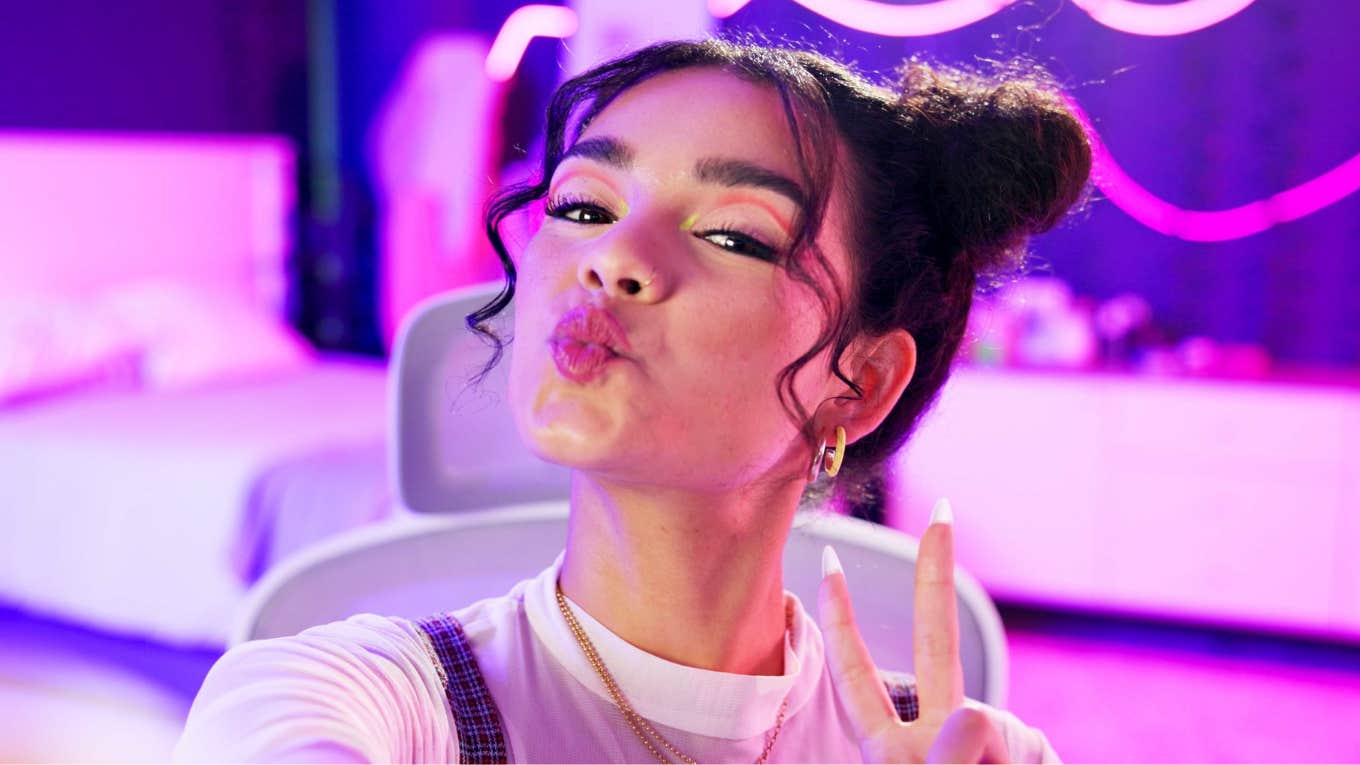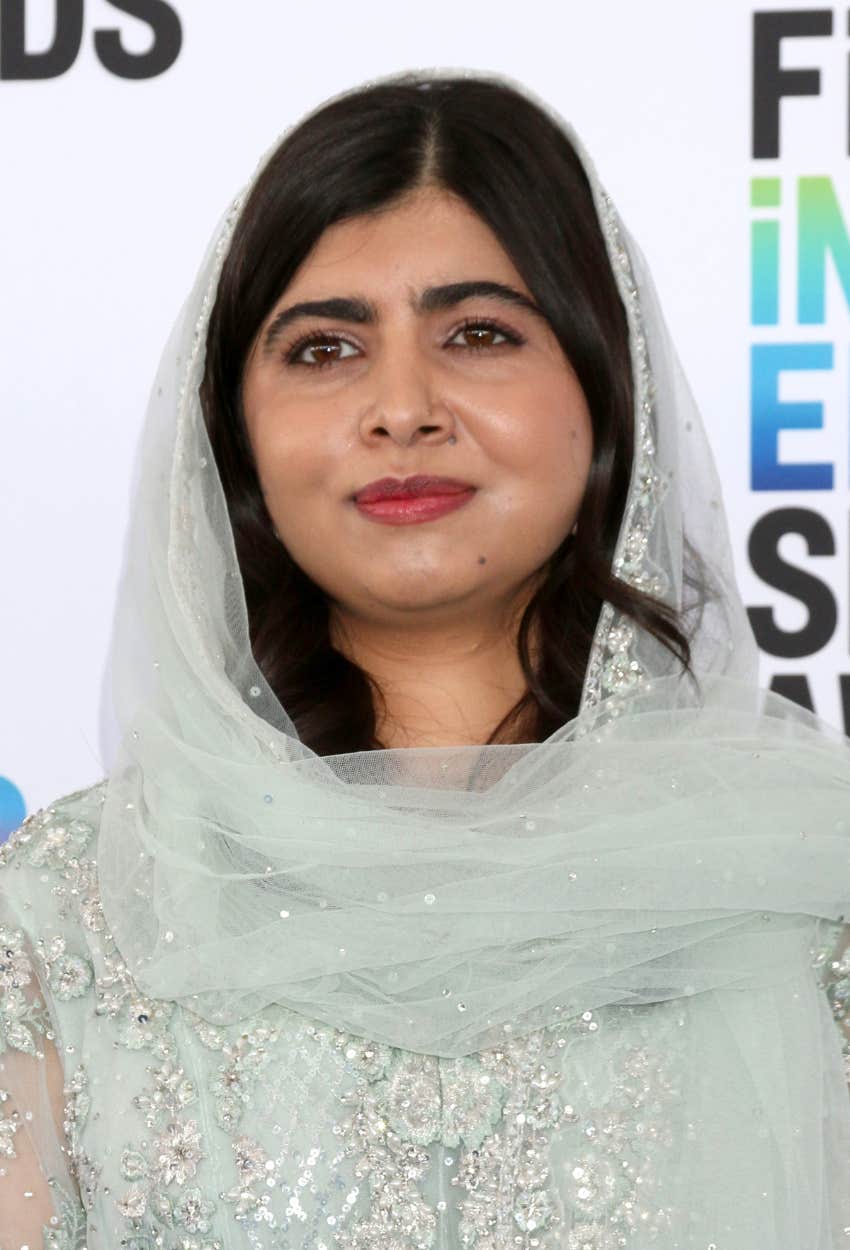Influencers Are Out — AI Predicts The 7 Types Of People Most Likely To Be Famous In The Future
These days the presentation of perfection is wearing thin. Will influencing be replaced with authenticity?
 PeopleImages.com - Yuri A | Shutterstock
PeopleImages.com - Yuri A | Shutterstock Celebrity culture has been forever changed by the advent of the "influencer." Though the word wasn't officially added to the dictionary until 2019, it's a term that has existed since Roman times. Though during those times, gladiators were the ones who endorsed products.
It's also been argued that former First Lady Eleanor Roosevelt was the "original media influencer," as she built a global brand as an informative and trustworthy American woman. That then morphed into Mommy Bloggers, who took the world by storm in the early internet days. In fact, they were the reason that laws were created stating that you have to clearly disclose when you're being paid for a social media post. But now that social media is rampant with influencers. Really, so many it'd be impossible to count, what are the next waves of fame that we can expect?
AI has predicted that influencers are out, and these are the 7 types of people most likely to be famous in the future
Ph.D. researcher Emma Marshall took to Threads to share what AI predicted when she asked about the next wave of fame.
1. Experts
 LPETTET | Getty Images Signature
LPETTET | Getty Images Signature
As mentioned previously, Mommy Bloggers were the reason that laws dictate that you need to disclose when you're advertising or promoting something. Despite these laws and regulations, it can still be hard to tell when someone is giving you their opinion versus being paid for it. Many influencers are also looked at as not having a real job, and therefore not having much life experience. Both these things can lead to distrust in influencer culture and influencers in general.
ChatGPT predicted, "With growing distrust in traditional media and influencer culture, there’s a shift toward valuing people who have depth, credibility, and lived or academic knowledge. These figures gain fame not for lifestyle aesthetics, but for what they know and how they communicate it. This includes scientists, social commentators, educators, and cultural analysts who present complex ideas accessibly."
We've seen a shift towards this already with the rising number of healthcare and science professionals on TikTok. With all the mindless scrolling we've become accustomed to, it looks like people are looking to learn while they scroll instead! For example, plastic surgeon Dr. Youn has 8.5 million followers on TikTok, and his videos average thousands of views.
2. Cultural preservationists and translators
"As the globalisation of media reaches saturation, there’s rising interest in local and indigenous traditions, languages, rituals, and cultural forms. Those who can both preserve and translate these for wider audiences — without diluting them — are increasingly seen as valuable. Fame here is less about spectacle and more about stewardship and storytelling," ChatGPT wrote.
Preserving culture is extremely important. It's the reason we have the history we do. Although the global popularity of the English language makes things convenient for those of us who live in the United States, it also puts some languages on the verge of extinction. You've probably heard of Latin as being a "dead" language, but there are more on the brink. This includes a lot of indigenous languages like Icelandic, Haida, Jedek, Ōlelo Hawaiʻi, and many more.
3. AI-generated or AI-enhanced personalities
It's unsurprising, and to me a little spooky, that AI predicted that some of the next waves of fame will come from AI itself.
"With AI becoming more sophisticated, entirely synthetic influencers or AI-human hybrids are beginning to gain followings. These can be digital avatars or algorithmic identities tailored to hyper-specific audience preferences. They don’t age, they’re always available, and they’re “brand-safe,” which appeals to companies," said AI.
There are already some AI personalities, as well as musicians, on TikTok and Instagram. The most popular, and I believe one of the first, is "Lil Miquela." She has millions of followers on social media and describes herself as a "robot." She has modeled for countless brands, promoted a variety of products, and even had an existential crisis. AI influencers, they're just like us!
4. Purpose-driven figures
 Kathy Hutchins | Shutterstock
Kathy Hutchins | Shutterstock
In a similar vein to expert-led fame, purpose-driven figures are less likely to seek fame and more likely to be people trying to raise awareness. As AI put it, "This is fame anchored in mission, not aesthetics. It’s slower-burning but more sustainable, and it’s increasingly supported by younger generations who value impact over influence."
We've already seen this over the years. People like Malala Yousafzai, the Pakistani education activist, and Greta Thunberg, the Swedish environmental activist, rose to fame because of the messages they were trying to spread, not because they were chasing fame itself.
5. Micro-celebrities
"The internet is fragmenting fame into subcultures. With platforms like TikTok, Discord, and Patreon, someone can be incredibly famous within a specific niche while being entirely unknown to the general public. This is fame without universality — intensely loyal, highly engaged, but decentralised," said ChatGPT.
There is already a term for micro-influencer. A micro-influencer is defined as a person with 10,000 to 100,000 followers. These can often be people in your community or people who focus on a particular niche. Yours truly is even considered a micro-influencer, an accolade I cultivated by focusing on sustainability and fashion.
If you're looking to find people to follow in your community, try looking at popular location tags in your city, or pay attention to who seems to always be at the hottest events in your town.
6. Vulnerable creators
 Roman Samborskyi | Shutterstock
Roman Samborskyi | Shutterstock
"Fame becomes rooted in relatability and resilience, not perfection," said AI, "There’s an emerging appetite for public figures who are not polished but raw, flawed, and transparent. This doesn’t mean oversharing — it means being real in a way that contrasts with the overly curated influencer era."
This is perhaps the prediction we have the fewest examples of. Though we've definitely seen celebrities get vulnerable on social media. Despite the lack of present examples, this is the prediction I think we're most in need of. One of the biggest gripes people have with social media is that it feels "too perfect." It's important to remember that what people are posting, whether they're celebrities or people you know in real life, is a highlight reel. They're not posting about the sobbing breakdown they had when they realized they bought the wrong cat food, which may or may not be a true story.
Brand editor and mother, Justine Lorelle LoMonaco, talked about how this is what led her to delete her social media account, saying, "Scrolling through Instagram sometimes feels like an obstacle course for my self-esteem. Whether I’m confronted with someone’s more lavish lifestyle or flatter stomach or more positive perspective on parenting, I’m often left feeling like…not enough."
LoMonaco isn't alone either. Penn Medicine did a study in 2019 about how social media usage can result in perfectionism. Assistant professor of clinical Psychiatry at the Center for the Treatment and Study of Anxiety, Jeremy Tyler, PsyD, weighed in, saying, “A big trigger for perfectionism is social media and that fear of missing out. It can be challenging to take a step back and recognize that what is being posted isn’t reality. Many assume that people with those perfect photos don’t have problems, but they do. It’s important to remember that the people behind the lens are just as stressed and nervous as everyone else."
7. Multidisciplinary storytellers
"The next phase of fame may favour those who combine different disciplines — music, movement, philosophy, design, science — to create immersive narratives or experiences. These individuals function less like celebrities and more like cultural nodes, blending art and education to form new formats of engagement," said AI.
As the New York Times put it, "Our technologies are tools, but our creative works carry the wisdom of the world." Much like our last category, there are fewer examples of multi-disciplinary storytellers than there are of other predictions. Though storytelling is not a new concept at all. You could argue that any short or long-form video content (whether on TikTok or YouTube) is based on storytelling.
According to Time Magazine, storytelling is what makes us human and is an important part of our evolution. So, it makes sense that the content we engage with on social media can often be a reflection of that.
If you want an example of storytelling, look no further than last year's "Who TF Did I Marry?” series by TikToker Reesa Teesa, whose story got so big it actually might be made into a major motion picture. If you want to fall down that rabbit hole, the first video is below.
"Each of these reflects a reaction to the era that came before: post-influencer disillusionment, digital saturation, and growing demand for meaning, depth, and real connection," explained Marshall.
I, for one, am excited to see if these AI predictions come true and what the next phase of fame will be.
Alexis Faible is a writer with a Bachelor's in fashion design and a Master's in journalism covering fashion, relationships, and human-interest stories.

